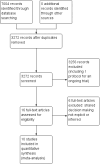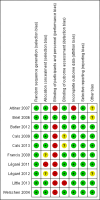Interventions to facilitate shared decision making to address antibiotic use for acute respiratory infections in primary care
- PMID: 26560888
- PMCID: PMC6464273
- DOI: 10.1002/14651858.CD010907.pub2
Interventions to facilitate shared decision making to address antibiotic use for acute respiratory infections in primary care
Abstract
Background: Shared decision making is an important component of patient-centred care. It is a set of communication and evidence-based practice skills that elicits patients' expectations, clarifies any misperceptions and discusses the best available evidence for benefits and harms of treatment. Acute respiratory infections (ARIs) are one of the most common reasons for consulting in primary care and obtaining prescriptions for antibiotics. However, antibiotics offer few benefits for ARIs, and their excessive use contributes to antibiotic resistance - an evolving public health crisis. Greater explicit consideration of the benefit-harm trade-off within shared decision making may reduce antibiotic prescribing for ARIs in primary care.
Objectives: To assess whether interventions that aim to facilitate shared decision making increase or reduce antibiotic prescribing for ARIs in primary care.
Search methods: We searched CENTRAL (2014, Issue 11), MEDLINE (1946 to November week 3, 2014), EMBASE (2010 to December 2014) and Web of Science (1985 to December 2014). We searched for other published, unpublished or ongoing trials by searching bibliographies of published articles, personal communication with key trial authors and content experts, and by searching trial registries at the National Institutes of Health and the World Health Organization.
Selection criteria: Randomised controlled trials (RCTs) (individual level or cluster-randomised), which evaluated the effectiveness of interventions that promote shared decision making (as the focus or a component of the intervention) about antibiotic prescribing for ARIs in primary care.
Data collection and analysis: Two review authors independently extracted and collected data. Antibiotic prescribing was the primary outcome, and secondary outcomes included clinically important adverse endpoints (e.g. re-consultations, hospital admissions, mortality) and process measures (e.g. patient satisfaction). We assessed the risk of bias of all included trials and the quality of evidence. We contacted trial authors to obtain missing information where available.
Main results: We identified 10 published reports of nine original RCTs (one report was a long-term follow-up of the original trial) in over 1100 primary care doctors and around 492,000 patients.The main risk of bias came from participants in most studies knowing whether they had received the intervention or not, and we downgraded the rating of the quality of evidence because of this.We meta-analysed data using a random-effects model on the primary and key secondary outcomes and formally assessed heterogeneity. Remaining outcomes are presented narratively.There is moderate quality evidence that interventions that aim to facilitate shared decision making reduce antibiotic use for ARIs in primary care (immediately after or within six weeks of the consultation), compared with usual care, from 47% to 29%: risk ratio (RR) 0.61, 95% confidence interval (CI) 0.55 to 0.68. Reduction in antibiotic prescribing occurred without an increase in patient-initiated re-consultations (RR 0.87, 95% CI 0.74 to 1.03, moderate quality evidence) or a decrease in patient satisfaction with the consultation (OR 0.86, 95% CI 0.57 to 1.30, low quality evidence). There were insufficient data to assess the effects of the intervention on sustained reduction in antibiotic prescribing, adverse clinical outcomes (such as hospital admission, incidence of pneumonia and mortality), or measures of patient and caregiver involvement in shared decision making (such as satisfaction with the consultation; regret or conflict with the decision made; or treatment compliance following the decision). No studies assessed antibiotic resistance in colonising or infective organisms.
Authors' conclusions: Interventions that aim to facilitate shared decision making reduce antibiotic prescribing in primary care in the short term. Effects on longer-term rates of prescribing are uncertain and more evidence is needed to determine how any sustained reduction in antibiotic prescribing affects hospital admission, pneumonia and death.
Conflict of interest statement
Peter Coxeter: none declared Chris B Del Mar: none declared Leanne McGregor: none declared Elaine M Beller: none declared Tammy Hoffmann: none declared
Figures

















Update of
- doi: 10.1002/14651858.CD010907
References
References to studies included in this review
Altiner 2007 {published data only}
-
- Altiner A, Brockmann S, Sielk M, Wilm S, Wegscheider K, Abholz HH. Reducing antibiotic prescriptions for acute cough by motivating GPs to change their attitudes to communication and empowering patients: a cluster‐randomized intervention study. Journal of Antimicrobial Chemotherapy 2007;60:638‐44. - PubMed
Briel 2006 {published data only}
-
- Briel M, Langewitz W, Tschudi P, Young J, Hugenschmidt C, Bucher HC. Communication training and antibiotic use in acute respiratory tract infections. A cluster randomised controlled trial in general practice. Swiss Medical Weekly 2006;136:241‐7. - PubMed
Butler 2012 {published data only}
Cals 2009 {published data only}
Cals 2013 {published data only}
Francis 2009 {published data only}
Légaré 2011 {published data only}
Légaré 2012 {published data only}
Little 2013 {published data only}
References to studies excluded from this review
Bourgeois 2010 {published data only}
-
- Bourgeois F, Linder J, Johnson S, Co J, Fiskio J, Ferris T. Impact of a computerized template on antibiotic prescribing for acute respiratory infections in children and adolescents. Clinical Pediatrics 2010;49:976‐83. - PubMed
Gonzales 2013 {published data only}
Pshetizky 2003 {published data only}
-
- Pshetizky Y, Naimer S, Shvartzman P. Acute otitis media‐‐a brief explanation to parents and antibiotic use. Family Practice 2003;20:417‐9. - PubMed
Regev‐Yochay 2011 {published data only}
-
- Regev‐Yochay G, Raz M, Dagan R, Roizin H, Morag B, Hetman S, et al. Reduction in antibiotic use following a cluster randomized controlled multifaceted intervention: the Israeli Judicious Antibiotic Prescription Study. Clinical Infectious Diseases 2011;53:33‐41. - PubMed
Samore 2005 {published data only}
-
- Samore M, Bateman K, Alder S, Hannah E, Donnelly S, Stoddard G, et al. Clinical decision support and appropriateness of antimicrobial prescribing: a randomized trial. JAMA 2005;294:2305‐14. - PubMed
Taylor 2005 {published data only}
-
- Taylor J, Kwan‐Gett T, McMahon Jr E. Effectiveness of a parental educational intervention in reducing antibiotic use in children: a randomized controlled trial. Pediatric Infectious Disease Journal 2005;24:489‐93. - PubMed
References to ongoing studies
Altiner 2012 {published data only}
Additional references
Ahovuo‐Saloranta 2014
Andrews 2012
Arnold 2005
Arroll 2002
-
- Arroll B, Goodyear‐Smith F, Thomas DR, Kerse N. Delayed antibiotic prescriptions: what are the experiences and attitudes of physicians and patients?. Journal of Family Practice 2002;51:954‐9. - PubMed
Boonacker 2010
-
- Boonacker CW, Hoes AW, Dikhoff MJ, Schilder AG, Rovers MM. Interventions in health care professionals to improve treatment in children with upper respiratory tract infections. International Journal of Pediatric Otorhinolaryngology 2010;74(10):1113‐21. [PUBMED: 20692051] - PubMed
Butler 1998
Butler 2001
-
- Butler CC, Kinnersley P, Prout H, Rollnick S, Edwards A, Elwyn G. Antibiotics and shared decision‐making in primary care. Journal of Antimicrobial Chemotherapy 2001;48:435‐40. - PubMed
Charles 1997
-
- Charles C, Gafni A, Whelan T. Shared decision‐making in the medical encounter: what does it mean? (or it takes at least two to tango). Social Science & Medicine 1997;44:681‐92. - PubMed
Chung 2007
Costelloe 2010
-
- Costelloe C, Metcalfe C, Lovering A, Mant D, Hay AD. Effect of antibiotic prescribing in primary care on antimicrobial resistance in individual patients: systematic review and meta‐analysis. BMJ 2010;340:c2096. - PubMed
Coyne 2013
Duncan 2010
Elwyn 2003
Elwyn 2012
Elwyn 2013
-
- Elwyn G, Lloyd A, Joseph‐Williams N, Cording E, Thomson R, Durand MA, et al. Option Grids: shared decision making made easier. Patient Education and Counseling 2013;90:207‐12. - PubMed
Giguere 2012
Gill 2006
-
- Gill JM, Fleischut P, Haas S, Pellini B, Crawford A, Nash DB. Use of antibiotics for adult upper respiratory infections in outpatient settings: a national ambulatory network study. Family Medicine 2006;38:349‐54. - PubMed
Gillies 2015
Gonzales 1997
-
- Gonzales R, Steiner JF, Sande MA. Antibiotic prescribing for adults with colds, upper respiratory tract infections, and bronchitis by ambulatory care physicians. JAMA 1997;278:901‐4. - PubMed
Gonzales 2001
-
- Gonzales R, Malone DC, Maselli JH, Sande MA. Excessive antibiotic use for acute respiratory infections in the United States. Clinical Infectious Diseases 2001;33:757‐62. - PubMed
GRADE Working Group 2004
GRADEproGDT 2015 [Computer program]
-
- McMaster University (developed by Evidence Prime, Inc.). GRADEpro Guideline Development Tool [www.guidelinedevelopment.org] [Computer program]. Version 12 August 2015. Hamilton: McMaster University (developed by Evidence Prime, Inc.), 2015.
Higgins 2011
-
- Higgins JPT, Green S (editors). Cochrane Handbook for Systematic Reviews of Interventions Version 5.1.0 [updated March 2011]. The Cochrane Collaboration, 2011. Available from www.cochrane‐handbook.org.
Hoffmann 2014
-
- Hoffmann T, Glasziou P, Boutron I, Milne R, Perera R, Moher D, et al. Better reporting of interventions: template for intervention description and replication (TIDieR) checklist and guide. BMJ (Clinical research ed.) 2014;348:g1687. [PUBMED: 24609605] - PubMed
Kenealy 2013
Kinnersley 2007
Légaré 2013
-
- Légaré F, Moumjid‐Ferdjaoui N, Drolet R, Stacey D, Härter M, et al. Core competencies for shared decision making training programs: insights from an international, interdisciplinary working group. Journal of Continuing Education in the Health Professions 2013;33(4):267‐73. [DOI: 10.1002/chp.21197] - DOI - PMC - PubMed
Légaré 2014
Makoul 2006
-
- Makoul G, Clayman ML. An integrative model of shared decision making in medical encounters. Patient Education and Counseling 2006;60:301‐12. - PubMed
Prochaska 1992
-
- Prochaska JO, DiClemente CC, Norcross JC. In search of how people change. Applications to addictive behaviors.. American Psychologist 1992;47:1102–14. - PubMed
Ranji 2008
-
- Ranji SR, Steinman MA, Shojania KG, Gonzales R. Interventions to reduce unnecessary antibiotic prescribing: a systematic review and quantitative analysis. Medical Care 2008;46(8):847‐62. [PUBMED: 18665065] - PubMed
RevMan 2014 [Computer program]
-
- The Nordic Cochrane Centre, The Cochrane Collaboration. Review Manager (RevMan). Version 5.3. Copenhagen: The Nordic Cochrane Centre, The Cochrane Collaboration, 2014.
Smith 2014
Spatz 2012
-
- Spatz ES, Spertus JA. Shared decision making: a path toward improved patient‐centered outcomes. Circulation: Cardiovascular Quality and Outcomes 2012;5:e75‐7. - PubMed
Spinks 2013
Stacey 2014
Thoolen 2013
-
- Thoolen B, Ridder D, Lensvelt‐Mulders G. Patient‐oriented interventions to improve antibiotic prescribing practices in respiratory tract infections: a meta‐analysis. Health Psychology Review 2012;6 Special Issue(1):92‐112.
van der Velden 2012
Venekamp 2015
Vodicka 2013
WHO 2001
-
- World Health Organization. WHO Global Strategy for Containment of Antimicrobial Resistance. http://www.who.int/csr/resources/publications/drugresist/en/EGlobal_Stra.... Geneva, 2001 (accessed 15 July 2013).
WHO 2012
-
- World Health Organization. The evolving threat of antimicrobial resistance: options for action. http://whqlibdoc.who.int/publications/2012/9789241503181_eng.pdf 2012 (accessed 15 July 2013).
Wood 2013
-
- Wood F, Phillips C, Brookes‐Howell L, Hood K, Verheij T, Coenen S, et al. Primary care clinicians' perceptions of antibiotic resistance: a multi‐country qualitative interview study. Journal of Antimicrobial Chemotherapy 2013;68:237‐43. - PubMed
Publication types
MeSH terms
Substances
LinkOut - more resources
Full Text Sources
Medical

